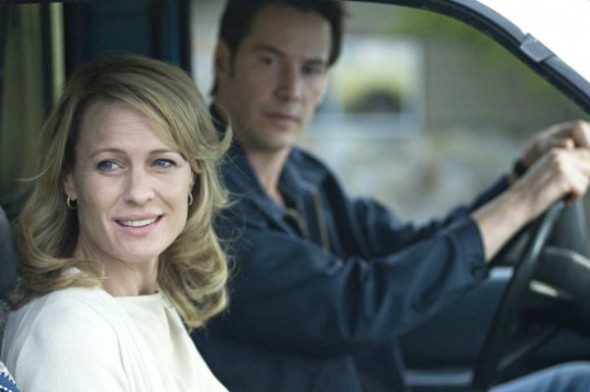
Screen Media Films | USA | 98 min
Writer/director Rebecca Miller (daughter of legendary playwright Arthur Miller) makes interesting movies: imperfect and rough and beautiful. The Private Lives of Pippa Lee, her newest film, fits right in (for the most part), telling the story of the mysteriously enchanting Pippa Lee (Robin Wright Penn), from young and confused to middle-aged and on the verge of a nervous breakdown.
As it goes, the narrative structure is pretty standard. The Pippa played by Wright Penn is the central character, interrupted occasionally by her own narration of her past life as a young girl smothered by a vane mother (Maria Bello) and on to her life as a young adult rebelling against anything that would/could smother her. This young adult Pippa is played by Blake Lively, offering a surprisingly subtle and impressive performance as a woman who hasn’t quite learned what it’s like not to be a girl, deciding to rely on the protection of an older man (the always reliable Alan Arkin) instead of growing up.
None of this hasn’t been shown/told before by other films and filmmakers. Pippa Lee is based on Miller’s own novel, and sometimes it plays like an audio book via Wright Penn’s sometimes unneeded narration (“I loved being with Herb [Arkin], he made me feel protected”). Luckily, the vast majority of the film is full of great performances by great performers who’ve made careers out of making good films very good and bad films enjoyable.
Take Keanu Reeves, who plays a 35-year-old fuck-up who woos the crashing Pippa with abrupt honesty. Reeves has spent the majority of his career taking a significant amount of criticism for a handful of emotionless roles (Neo, Johnny Utah, Johnny Mnenomic). Yet the actor tends to offer a surprising amount of range in these small indies in which he takes on pivotal supporting roles (see Thumbsucker and The Gift for further proof). Here he provides the sole romantic trajectory from any male character, and holds his own. His character Chris is honest to a fault and a self-proclaimed asshole who has lost any semblance of faith and doesn’t know what to do next. He finds a potential answer in the intriguing Pippa, but instead finds more conflict. And while these dilemmas certainly pile up, Reeves’ Chris is always calm, always curious, playing off Wright Penn’s Pippa nicely.
For the most part, this entire film is calm – much more calm than, say, Miller’s most recent film before this, The Ballad of Jack and Rose, which followed its female protagonist through her wild adolescence. Pippa’s adolescene we barely see. Sure, Lively has a moment of reckless abandon (during a nice little Julianne Moore cameo, playing a lesbian lover interested in kinky photography), but that’s the extent of it. Before long, young Pippa is at a drug-infested book publisher’s party on the beach. She meets said publisher, Herb (Arkin), who quickly becomes her protector. This part of the film runs by too fast, not allotting Lively enough time to impress an indie crowd mostly likely skeptical of the Gossip Girl girl’s acting abilities.
The cinematography, courtesy of Declan Quinn, highlights the ageless beauty of Pippa, from Lively’s curly, golden looks to Wright Penn’s straightened, repressed faded blonde against a lush green suburban landscape. In many ways, it looks too good for its own good. Scenes personifying Pippa’s developing nervous breakdown are vivid portraits full of fluid camera movement. It’s the most graceful fall from grace ever put on film.
But then this whole film is something like that. And though it lacks some bite (and offers a clean ending it is far better than) the spot-on performances and tight storytelling makes it a worthwhile indie and a true testament to actors willing to take risks.
7 out of 10
Did you see this film? Do you agree?

